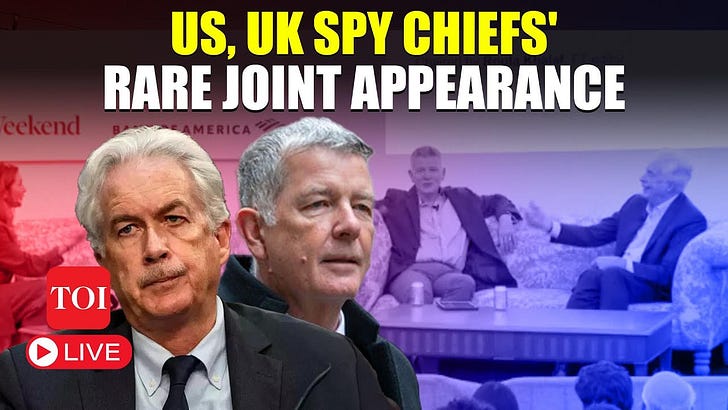Welcome! I’m Tom Griffin and this is my intelligence history newsletter. Feel free to share this post with the button below.
CIA Director William J. Burns and MI6 Chief Richard Moore interviewed by Roula Khalaf at the FT Weekend Festival (Times of India/YouTube).
When the CIA concluded in August 2016 that Vladimir Putin was personally involved in a cyber-campaign to disrupt that year's presidential election, the Obama administration reacted cautiously, according to the Washington Post. It was not until 7 October that two administration officials, Homeland Security Secretary Jeh Johnson and Director of National Intelligence James Clapper, publicly blamed Russia for hack and leak attacks in the US. A package of retaliatory measures was not agreed until December, weeks after Donald Trump had defeated Hillary Clinton.
As the 2024 election nears, the Biden Administration seems to be taking a very different approach. On Wednesday, the Justice Department charged employees of Russian state broadcaster RT with offences under the Foreign Agent Registration Act, claiming that they were using a Tennessee-based company to promote Russian government messaging in the United States. The DOJ statement did not name the US company, but Reuters has identified it as Nashville-based Tenet Media.
On the same day, the Justice Department announced the seizure of 32 internet domains linked to alleged ‘doppelganger’ activity, mimicking existing websites. In this instance, attorney general Merrick Garland made an explicit link to electoral interference.
As alleged in our court filings, President Vladimir Putin’s inner circle, including Sergei Kiriyenko, directed Russian public relations companies to promote disinformation and state-sponsored narratives as part of a campaign to influence the 2024 U.S. Presidential Election. An internal planning document created by the Kremlin states that a goal of the campaign is to secure Russia’s preferred outcome in the election. The sites we are seizing today were filled with Russian government propaganda that had been created by the Kremlin to reduce international support for Ukraine, bolster pro-Russian policies and interests, and influence voters in the United States and other countries. Our actions today make clear that the Justice Department will be aggressive in countering and disrupting attempts by the Russian government, or any other malign actor, to interfere in our elections and undermine our democracy.
A sanctions announcement by the Treasury Department linked the doppelganger websites, to ‘pro-Kremlin hacktivist group RaHDit’, said to have been founded by a former FSB officer.
On Thursday, the DOJ turned its attention to Russian military intelligence, indicting a group of hackers said to include five officers in the GRU’s Unit 29155.
An advisory issued the same day by twenty US, NATO and Ukrainian agencies stated:
Unit 29155 is responsible for attempted coups, sabotage and influence operations, and assassination attempts throughout Europe. Unit 29155 expanded their tradecraft to include offensive cyber operations since at least 2020. Unit 29155 cyber actors’ objectives appear to include the collection of information for espionage purposes, reputational harm caused by the theft and leakage of sensitive information, and systematic sabotage caused by the destruction of data.
It is tempting to see the joint appearance of CIA director William Burns and MI6 chief Richard Moore at the FT Weekend Festival on Saturday as part of a similar show of strength. In their FT article, they stated that ‘we continue to work together to disrupt the reckless campaign of sabotage across Europe being waged by Russian intelligence, and its cynical use of technology to spread lies and disinformation designed to drive wedges between us.’
They did not, however, explicitly mention electoral interference in the US. That perhaps is an indication that despite last week’s flurry of activity, the US intelligence community still has to be wary of being drawn into the domestic political battle. In some ways, the dilemma is more acute than under Obama. In the early autumn of 2016, many officials expected that the task of dealing with Russian interference would be handed on to a Clinton presidency. There are no doubt fewer illusions about the competitiveness of this year’s election.



